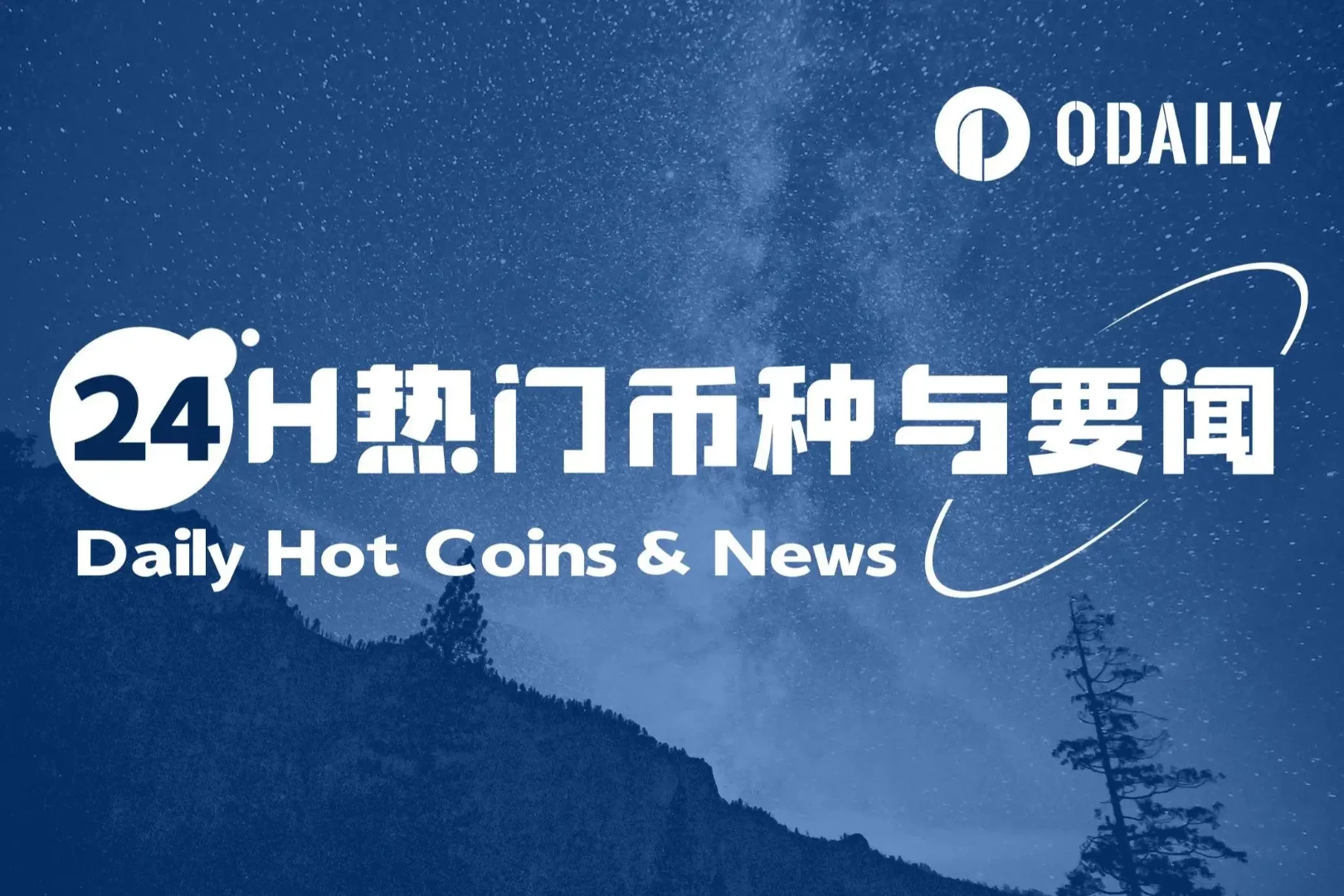
1. Popular CEX currencies
Top 10 CEX trading volume and 24-hour price changes:
- BTC: 0.12%
- ETH: 1.16%
- SOL: 1.03%
- DOGE: 1.33%
- BNB: 1.30%
- PEPE: 0.64%
- ADA: 5.17%
- BIO: 31.55%
- POND: 18.71%
- QI: 0.14%
24-hour price increase list (data source: OKX):
- BIO: 23.86%
- RUNECOIN: 17.72%
- MEMEFI: 17.55%
- J: 6.34%
- ERN: 6.17%
- SKL: 4.96%
- SLP: 4.39%
- ARG: 1.73%
- POR: 1.58%
- ASP:1.05%
2. Top 5 popular memes on the chain (data source: GMGN ):
- FORK
- CURIO
- GROK
- return
- SPARK
3. 24-hour hot search currencies
CURIO (CURIO AI) is the meme coin of the Solana chain. CURIO AI is a children's playmate. It is actually three plush toys designed and voiced by @Grimezsz , Grem, Gabbo, and Grok, to help children reduce their time addicted to electronic screens.
Headlines
Japan to approve first yen-denominated stablecoin JPYC
According to Nikkei, Japan's Financial Services Agency (FSA) will approve the issuance of the country's first yen-denominated stablecoin, JPYC, this month. The FSA will register fintech company JPYC Inc. as a remittance business, with sales expected to begin within weeks of registration. The digital currency will be backed by liquid assets such as government bonds to maintain its value at a constant 1 JPYC = 1 yen.
According to official news, Faraday Future (FF), owned by Jia Yueting, released and launched the "EAI+Crypto" dual flywheel & dual bridge ecological strategy, launched the C10 Treasury plan, the first basket combination index of the top ten crypto assets in the US stock market, and released the "C10 Index".
C10 Treasury will adopt an 80% passive + 20% active portfolio to provide potentially sustainable returns and fund product innovation, potential share repurchases, and further asset growth. Crypto assets will be purchased through dedicated financing. The first phase of the strategy includes an asset purchase plan of up to $500 million to $1 billion, with the initial allocation of $30 million expected to begin as early as next week. In subsequent phases, the company aims to accelerate asset growth, reaching tens of billions of dollars as soon as possible.
The C10 Treasury plans to accumulate and compound a portfolio of the world's top ten crypto assets (excluding stablecoins), aiming to become the primary treasury within the C10 portfolio. FF also announced the first four products of its Crypto Flywheel: the C10 Index (www.c10index.com), the C10 Treasury, the Crypto+EAI ecosystem application, and the future C10 ETF.
It is reported that FF is applying to register a wholly-owned subsidiary, FFAI Crypto Treasury and Bridging Holdings Inc., and its affiliated companies, which specialize in crypto business; it is also exploring the possibility of launching ETF products in the future.
The EAI EV and Crypto businesses are two independent entities under the publicly listed company FFAI. Core principles of these businesses are: legal independence, operational independence, account independence, asset transparency, and future governance independence. Crypto assets are held in third-party custody, completely separated from the automotive business in terms of both legal and capital. Holdings are transparent and traceable on-chain.
In addition, California State Treasurer Fiona Ma expressed her support and endorsement for FF's new strategy through a video speech.
Overseas RWA issuance has recently seen increased interest, but the quality of the underlying assets is uneven, and transaction structures and pricing are questionable. Industry insiders point out that the Hong Kong Monetary Authority (HKMA) favors sectors such as new energy and aviation and trade financing in its RWA selection, while rejecting real estate projects. Current investors are primarily Hong Kong-based private equity funds, family offices, and wealth management institutions, with limited international capital participation, making the relevant structures more accessible to Chinese investors. Other observers note that some RWA projects have limited fundraising, but due to the fast issuance process and low barriers to entry, companies hope to generate buzz through a "coin-equity linkage." However, the equity-sharing mechanism does not fully consider asset costs, posing a risk of violating economic logic.
Juan Leon, senior investment strategist at Bitwise, said that the amount of ETH that is about to be unstaked is increasing. The validator exit queue of the Ethereum blockchain reached 855,158 ETH on Friday, a record high. This may be the reason for the recent pullback of the asset. The unstaked Ethereum queue usually has a negative impact on the ETH price and may also bring greater market selling pressure in the future.
Because staked tokens like stETH can trade at a discount, and the discount will reduce the value of the collateral, thereby triggering risk reduction, hedging and even liquidation, and ultimately leading to the sale of ETH spot. Leveraged "stETH cycle" transactions conducted through the DeFi protocol liquidity pool will no longer be profitable, and traders will also create simultaneous selling pressure by closing positions and selling ETH to repay loans.
Industry News
According to the Xiongan official account, under the guidance and support of the Xiongan New Area branch of the People's Bank of China, the Hebei Xiongan branch of the Industrial and Commercial Bank of China combined the functional characteristics of the digital currency bridge and the integrated foreign currency and RMB funds pool business of multinational corporations to successfully handle the first multilateral central bank digital currency bridge business for Sinochem Group Finance Co., Ltd., the first batch of central enterprise financial companies to be relocated.
Thailand to launch cryptocurrency exchange program to facilitate payments for foreign tourists
Thailand will launch its "TouristDigiPay" program next Monday, allowing foreign tourists to exchange cryptocurrencies for Thai baht for spending, aiming to boost tourism. The program will be unveiled at a press conference chaired by Deputy Prime Minister and Finance Minister Pichai Chunhavajira and attended by officials from the Ministry of Finance, the Securities and Exchange Commission, the Anti-Money Laundering Office, and the Ministry of Tourism and Sports. The Securities and Exchange Commission of Thailand previously sought public feedback on proposals to use digital assets to boost the economy and tourism industry, with the feedback period ending on August 13.
Solana's maximum TPS per block reached 107,664, a record high.
The Solana network's maximum single-block processing speed reached 107,664 transactions per second (TPS), setting a record for the highest throughput in the network's history.
Metaplanet bought 90% of its BTC assets in the past 6 months
90% of Metaplanet's BTC assets were purchased in the past 6 months.
Project News
The LayerZero Foundation's proposal to acquire Stargate has begun voting, with a current support rate of 97.07%. Voting will end on August 24.
USDD 2.0 Phase 8 Market Supply Mining Campaign Now Live on JustLendDAO
According to an official announcement, JustLendDAO has officially launched the eighth phase of its USDD 2.0 market supply mining campaign, which will run from 20:00 (SGT) on August 16, 2025, to September 13, 2025. This campaign utilizes a tiered interest rate reward mechanism. Users can participate in liquidity mining by depositing USDD, earning up to a 6% annualized yield, with rewards distributed weekly. As a leading DeFi protocol within the TRON ecosystem, JustLendDAO will continue to provide users with secure and efficient income opportunities.
Sky Lianchuang RuneKek used 1.77 million ENA to repurchase 16.38 million SKY
In the past 40 minutes, RuneKek, co-founder of Sky (formerly MakerDAO), used 1.77 million ENA (worth $1.29 million) obtained from investment to repurchase 16.38 million SKY.
RuneKek received 1.77 million ENA (worth $1.29 million) from the Ethena vesting contract 40 minutes ago, and then transferred it to the address used to repurchase SKY for sale, in exchange for 16.38 million SKY.
Since the beginning of June, RuneKek has used a total of $10.21 million in funds to repurchase 122 million SKY at an average price of $0.0836 through the income from staking SKY (USDS and SPK) and today's ENA.
Ave.ai fully supports X Layer, allowing users to capture 100x profit opportunities
Ave.ai, an on-chain aggregation trading platform, announced a major functional upgrade and ecosystem integration for its supported Layer 2 network X Layer, providing users with powerful tools to seize the hot opportunities on the chain.
Currently, Ave.ai now fully supports X Layer on-chain data query on all its terminals (Web, iOS, and Android), allowing users to seamlessly track X Layer ecosystem asset prices, liquidity, and market trends anytime, anywhere.
Ave.ai desktop (PC) and Android mobile users can now trade X Layer assets on-chain and off-chain directly within the platform, achieving efficient and low-slippage trading.
Additionally, users can instantly buy and sell X Layer tokens directly through Ave.ai's official Telegram chatbot, @AveSniperBot. Ave TG's coin search bot, @AveTokenFinderCNBot, has also added X Layer support. Entering "ca" will display detailed information such as the token name and market capitalization.
The Ave.ai user community has demonstrated exceptional early project discovery capabilities. Users within the Ave community were among the first to seize the Xdog Golden Dog project. In light of the X Layer's current market popularity and growth potential, Ave.ai stated its commitment to continued investment, optimizing and expanding its functional integration and user experience, to help users participate more efficiently.
Regulatory trends
The U.S. Treasury Department is seeking public feedback on how digital identity tools and other emerging technologies can be used to combat illicit financing in cryptocurrency markets. One option is to embed identity verification into DeFi smart contracts. According to the Treasury, digital identity solutions (which could include government ID cards, biometrics, or portable credentials) can reduce compliance costs while strengthening privacy protections. They can also make it easier for financial institutions and DeFi services to detect money laundering, terrorist financing, or sanctions evasion before transactions occur. One idea proposed in the draft for public comment is that DeFi protocols could integrate digital identity credentials directly into their code. In this model, smart contracts could automatically verify users' credentials before executing transactions, effectively building know-your-customer (KYC) and anti-money laundering (AML) safeguards into blockchain infrastructure. The advisory, released this week, stems from the newly enacted GENIUS Act, which was signed into law in July.
Investment and Financing
Almanak, a DeFi smart agent platform, announced the completion of an $8.45 million funding round from investors including Delphi Labs, HashKey Capital, BanklessVC, NEAR Foundation, RockawayX, Matrix Partners, AppWorks, Sparkle VC, and Shima Capital. Almanak is reportedly developing an AI-powered decision-making framework for analyzing market patterns and managing risk to create and deploy automated financial strategies.
Character Voice
In a discussion about the "biggest issues in DeFi today," users cited the lack of tokens with sustainable revenue and demand, insufficient privacy, and a lack of uncollateralized lending as key challenges. Solana founder Toly commented that privacy is not a core factor in product-market fit (PMF) and is insufficient on its own to significantly change user behavior.
Ondo Executive: Tokenization Already Has the Infrastructure to Succeed
Ian De Bode, Chief Strategy Officer of Ondo Finance, stated on The Rollup Co. that the market is now ready for tokenization. He noted that unlike in the past, increasing on-chain adoption, ample stablecoin liquidity, and the existing DeFi ecosystem provide the necessary infrastructure support for the implementation and development of tokenization.
Charles Allen, CEO of Ethereum treasury company BTCS, stated that the crypto market emphasizes real-time transparency, while publicly traded companies adhere to a quarterly disclosure cadence, requiring disclosure of major events within four days. Current regulations allow companies to disclose more frequently when they don't involve audited GAAP metrics, but boards of directors also have a fiduciary responsibility to protect shareholder interests, and excessive transparency may not necessarily be in shareholders' best interests. He described it as "showing all your cards on the table is not a recipe for success."
Metaplanet CEO: The goal of increasing Bitcoin holdings to 30,000 this year has not changed
Metaplanet CEO Simon Gerovich stated in a post on the X platform that the company's goal of increasing its Bitcoin holdings to 30,000 this year remains unchanged (current holdings are 18,113 BTC), and that it will own 1% of all Bitcoin by 2027. Metaplanet is currently following a clear roadmap to guide daily execution and long-term goals. Metaplanet is fully transparent, providing proof of reserves and open access to its performance dashboard. Trust is built on verification. Metaplanet, along with Strategy and others, is incentivizing hundreds of companies worldwide to add Bitcoin to their balance sheets, driving growth and adoption. The recent market decline is normal; what truly instills confidence in the market is the continued strengthening of fundamentals.
Galaxy Digital: Rapid accumulation of leverage in the crypto market is increasing systemic pressure
Galaxy Research's latest report indicates that the volume of collateralized lending in the crypto market increased by 27% quarter-over-quarter in the second quarter, reaching $53.1 billion, a new high since early 2022. This was primarily driven by increased demand for DeFi lending and a rebound in risk appetite. Bitcoin's recent decline from $124,000 to $118,000 triggered over $1 billion in long position liquidations, the largest since August. Analysts believe this likely reflects profit-taking, but also highlights the market's fragility caused by the rapid accumulation of leverage.
Galaxy analysts indicate that pressure points are gradually emerging. A large withdrawal from Aave in July pushed ETH lending rates above the staking yield, disrupting the "circular arbitrage" logic and leading to a record 13-day exit queue from the Ethereum Beacon Chain. Meanwhile, OTC USDC borrowing costs have continued to rise since July, while on-chain interest rates have remained stable. The spread between the two has widened to its highest level since the end of 2024, indicating that off-chain demand for USD exceeds on-chain liquidity. Galaxy warns that systemic pressure is increasing amidst a surge in loan volumes, concentrated lending, and tightening liquidity. The recent $1 billion liquidation event serves as a reminder that leverage risk has a two-way effect in the market.
The ETF Store President: Treasury company stocks should be considered derivatives of BTC and ETH
Nate Geraci, president of The ETF Store, wrote in a post that so-called "treasury firms" are essentially companies that buy BTC and ETH, and their stocks should be modeled as derivatives of Bitcoin and Ethereum, which come with additional special risks. He expressed surprise that this view has sparked controversy in the industry.
- 核心观点:加密货币市场活跃,监管与创新并行。
- 关键要素:
- 日本将批准首个日元稳定币JPYC。
- 法拉第未来推出加密资产组合计划。
- 香港金管局倾向新能源类RWA项目。
- 市场影响:推动市场多元化与合规发展。
- 时效性标注:中期影响。



